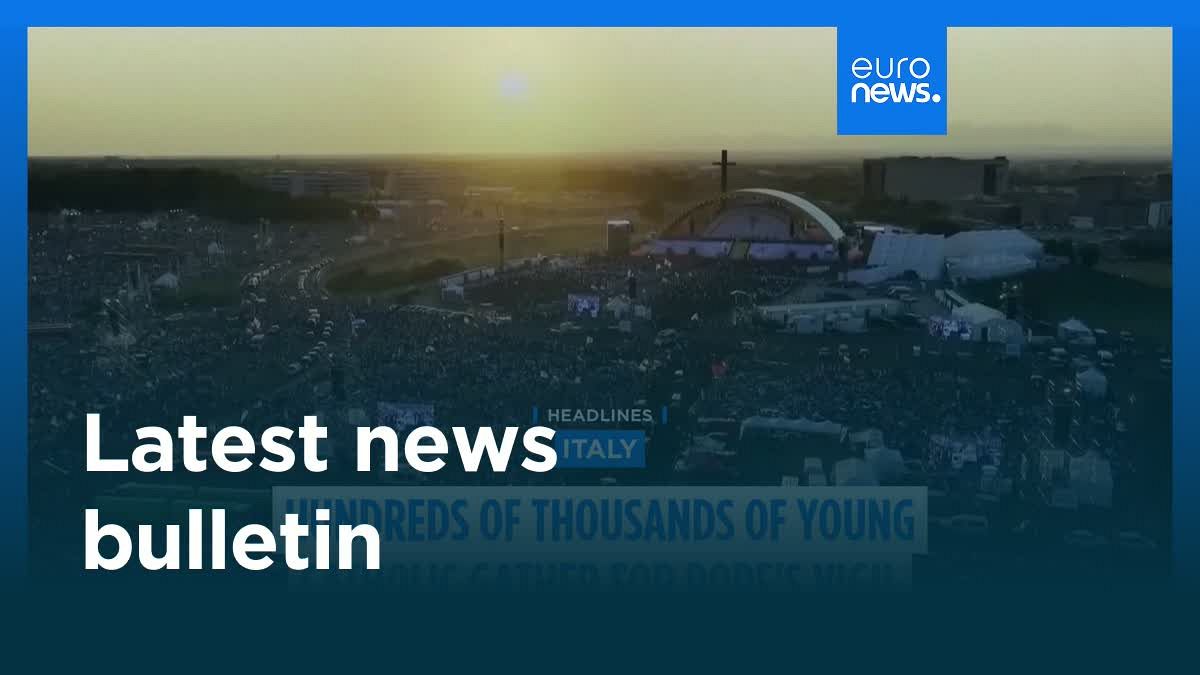Israeli Prime Minister Benjamin Netanyahu denies that Gazan are starving. "There is no starvation in Gaza, no policy of starvation in Gaza," Netanyahu saidon Sunday, during an event with Daystar, an evangelical TV network, held in Jerusalem.
His remarks stand in stark contrast to mounting evidence from aid agencies, humanitarian organizations, and eyewitnesses who describe an escalating food crisis, particularly in the north of the enclave.
A DW Fact check takes a closer look.
What the reports say
The Integrated Food Security Phase Classification (IPC), a global hunger monitoring body, has warnedthat famine thresholds have been surpassed in parts of Gaza —particularly in Gaza City—calling the crisis a "worst-case scenario" now unfolding.
According to the World Health Organization, 63 of the 74 malnutrition-related deaths recorded in Gaza this year occurred in July alone—including 24 children under the age of five and 38 adults.
Meanwhile, aid workers on the ground reportthat they themselves are going hungry and Gaza's Health Ministry says dozens of people have died from starvation-related causes over the past three weeks.
With international pressure rising, British Prime Minister Keir Starmer said that he would officially recognize a State of Palestine at the UN General Assembly in September unless Israel takes "substantive steps to end the appalling situation in Gaza."
UK plans to recognize Palestine if Israel doesn't stop war
"They blame Hamas"
Israeli officials, however, including Ministry spokesperson Oren Mamorstein, have rejectedthe malnutrition and starvation figures released by Gaza's health authorities and UN bodies, calling them exaggerated and unreliable.
They argue that the numbers, some provided by Hamas,a group designated as a terrorist organization by Israel, the EU, and others, lack credibility. However, a new independent study says they are actually too low.
Israeli Prime Minister Benjamin Netanyahu is not alone in denying that Gaza is facing starvation. His comments have been echoed across social media by numerous online personalities and accounts that either downplay the severity of the crisis or claim reports of widespread hunger are fabricated.
Israel imposed a complete blockade of food, fuel and other supplies in March and numerous politicians—including Netanyahu—have repeatedly said that no food would enter Gaza. Israeli Finance Minister Bezalel Smotrich said in August 2024 that "it might be justified and moral" to let Israel "cause 2 million civilians to die of hunger" until the "hostages are returned."
"This is the official line repeated by the Prime Minister, his cabinet, and the far-right media," Oren Persico of the Israeli independent outlet The Seventh Eye told DW. "They either deny that starvation is happening, blame Hamas for not surrendering, or even claim it's a good thing—because it supposedly helps pave the way for building Jewish settlements in Gaza."
"Genetic muscular disorder"
Several accounts challenge widely shared photos of severely emaciated children in Gaza, claiming they're misleading or lack context. One image—of Muhammad Zakariya Ayyoub al-Matouq—featured in reports by several international news outletshas also circulated widely on social media alongside posts condemning the humanitarian crisis.
Pro-Israel commentators, along with Israel's Ministry of Foreign Affairs, later claimed the boy had a rare genetic muscular disorder and alleged that omitting this detail was an attempt to defame Israel.
While some posts and reports did lack that context, outlets like CNNacknowledged his condition and noted that he had been living a healthier life before the war, thanks to therapy and adequate nutrition, writing: "He has a muscle disorder that requires physical therapy and specialized nutrition, and he faces life-threatening malnutrition as the humanitarian situation worsens due to ongoing Israeli attacks and the blockade."
The New York Times also confirmedhe suffered from malnutrition in addition to a pre-existing illness.
Still, a large number of accounts continued to circulate the claim that such photos were being misused to falsely suggest starvation—something they insist does not exist.
One widely shared post (see screenshot below) reads: "A boy from Gaza with a rare muscular disease is being exploited to promote the fake campaign of starvation in Gaza." DW Fact check identified dozens of nearly identical posts circulating the same image and text.
 This picture and caption have been shared by many accounts alleging that the child’s genetic disorder has been misused to "fake" starvation in GazaImage: X
This picture and caption have been shared by many accounts alleging that the child’s genetic disorder has been misused to "fake" starvation in GazaImage: X"Pre-existing medical condition does not rule out malnutrition"
Our team showed the picture shared by these posts to several pediatricians in Germany to verify the claims about the child's muscular disorder. They noted that the exact condition cannot be diagnosed from photos and videos alone.
However, they emphasized that a pre-existing medical condition does not rule out malnutrition, and attributing all signs of emaciation solely to genetic disorders overlooks the broader impact of prolonged nutritional deficiency.
For Oren Persico from The Seventh Eye the accusations from the Israeli government are part of a political strategy. "One tactic being used is to highlight non-representative examples and present them as proof that human suffering in Gaza isn't happening," he explained.
"It's like conspiracy theories who fix on irrelevant details to distort the overall picture. In that sense, I would call it a disinformation campaign—one that cherry-picks fringe facts to deny the overwhelming body of evidence, including eyewitness accounts, data, and reports."
Bustling food market in Gaza?
A similar narrative surfaced around a piece of video published by outlets including the Jerusalem Post which shows a close-up of a vegetable stall in a Gaza market. The footage quickly spread across social media, where it was used by accounts seeking to challenge reports of famine in the territory.
"…This is footage from today at Al-Sahaba market in Gaza City, completely packed with food. So much for starvation. The average Gazan eats better than you!", writes one account.
DW Fact check spoke with Majdi Fathi, the journalist accredited for the video. He confirmed that the footage is authentic and shows a market inside Gaza, but added that it does not mean food is available for all.
"These vegetables and fruits are very expensive," Fathi said. "The majority of people in Gaza cannot afford them. What Gaza lacks are other food items such as meat, milk, rice and eggs. I did not find anything else to film in the market."
 The video was shared by dozens of accounts, some of which falsely claimed it disproved reports of widespread hunger in Gaza.Image: X
The video was shared by dozens of accounts, some of which falsely claimed it disproved reports of widespread hunger in Gaza.Image: X
Other media reports support his view. A BBC investigation found that food packages delivered by local aid groups in Gaza often lack the nutritional variety needed for a healthy diet, leading to deficiencies and long-term health issues even when quantities are adequate.
"Until now, meat, eggs, milk, and other essentials have not entered," Fathi said. "The problem is also the high prices. Since the beginning of the war, many families haven’t been able to work and have no income to buy food."
On his Instagram account, he shared another video showing Gazansat the market complaining about the soaring cost of basic goods.
Israel's recent move to allow more aid deliveries has slightly eased prices in some areas, but the impact remains limited. While the aid is meant for free distribution, some supplies are being stored, diverted, or resold.
With no clear oversight by aid groups, local authorities, or Israeli forces, the extent of diversion is unclear.
Israeli officials have repeatedly claimed that Hamas is responsible for stealing this aid. However, The New York Times reports that Israeli military officials have confirmed there is no evidence that Hamas systematically looted UN humanitarian aid, including from UN convoys—it instead alleges sporadic theft from smaller actors, not organized diversion by Hamas.
Between 120 and 200 aid trucks entered Gaza on Sunday, according to UN estimates, with an additional 260 trucks reportedly awaiting clearance as of Monday. But aid officials have described those efforts as inadequate and, in some cases, dangerous for civilians on the ground to collect them.
Desperation in Gaza grows as food supplies dwindle
Edited by: Astrid Prange de Oliveira and Sarah Hofmann

 2 days ago
4
2 days ago
4









